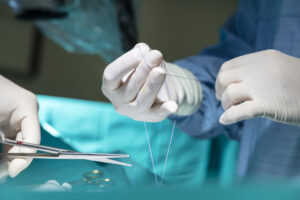Key Points:
- Injuries to the ribs and the vital muscles and connective tissue around them are common in car accidents and can sometimes prove fatal.
- It’s important to get a medical evaluation following an accident to identify possible internal injuries.
- Rib injury treatment can take time, which could mean you’ll be out of work for days, weeks, or even months.
- A free consultation with a car accident attorney could help you obtain a full and fair settlement.
Car accidents often cause blunt force trauma injuries. This trauma commonly happens when the impact of the collision throws the victim violently against the steering wheel, the dashboard, or even the seatbelt – all of which can cause rib cage injuries.
The rib cage is a crucial part of the body that surrounds and protects vital organs, including the heart and lungs. When that protective cage is compromised, it can lead to painful or even life-threatening conditions.
Common Rib Injuries from Car Accidents
When the intense gravitational force of car accidents is applied to the chest and rib area, various injuries can occur.
Rib injuries can range from minor to life-threatening, so it’s crucial to see a doctor right away if experiencing chest pain or tenderness after a crash.
Most rib injuries fall into one of these categories:
- Fractured or broken ribs: When intense gravitational force is applied to the bones of the ribcage, fractures or breaks can occur. Damage to the rib bones can be very painful and can include symptoms of chest pain that intensify when laughing, coughing, or breathing and swelling and redness in the area.
- Soft tissue injuries: The muscles and tissues that surround the ribs make it possible for the ribcage to expand and contract as you breathe and move. Any blow to the ribs can injure the soft tissues around the bones of the ribcage. With soft tissue rib injuries, it can become painful to move and healthy respiration can suffer, which can cause complications.
- Bruising: Strain or injury to the tissue, cartilage, and muscles of the chest wall can lead to bruised ribs. The symptoms can include chest pain, tenderness in the area, swelling, visible bruising, and spasms in the chest.
- Costochondral separation: This injury occurs when the ribs separate from the cartilage that connects ribs to the breastbone (or sternum).
- Intercostal strains: The intercoastal muscles are what attaches your rib bones to one another. Intercoastal strains occur when these muscles stretch, pull, or tear.
- Flail chest injury: This is the most serious of all rib injuries, and occurs when three or more ribs are broken in two or more places. This can greatly decrease the integrity of the rib cage, causing it to lose its normal shape.
Because many rib injuries have similar symptoms of sharp pains, tenderness, and swelling of the area, a doctor will often take x-rays or CT scans to verify the type and severity of a rib injury.
When Rib Injuries Are Life Threatening
Sometimes, rib injuries are not taken seriously enough. However, if there is breaking, bruising, or blunt force trauma to the ribs, there can be more serious damage to underlying organs as well.
A visit to the hospital or doctor’s office following a rib injury is always in order. The ribs enclose vital organs, such as the heart and lungs, so chest trauma can lead to serious or even fatal complications such as:
- Pneumothorax: The term used to describe a collapsed lung. A lung collapse may occur when a broken rib or foreign object tears into the lung or chest wall, and the pressure inside the chest cavity changes. Symptoms of pneumothorax include trouble breathing, pain in the chest, and coughing up blood.
- Cardiac and associated blood vessel injury: When there is extensive trauma to the aorta or the coronary artery, death can happen quickly.
- Ruptured spleen: The spleen is an organ situated on the left side of the abdomen, which filters and removes abnormal cells from your system. This organ also manufactures some immune system cells, like lymphocytes and antibodies. When there is a rupture of the outer capsule of the spleen, it can cause life-threatening bleeding into the abdominal cavity.
Rib Injuries Can Easily Be Overlooked
After a car accident, victims often think it is normal to be sore. Therefore, rib injuries are not always treated in the first hours after an accident.
However, the longer rid injuries go untreated, the higher the risk of complications or mortality. This is particularly true with elderly victims, whose bones are brittle and more prone to breakage. To make matters worse, since breathing becomes painful with rib injuries, victims don’t often take the deep breaths that fully inflate the lungs, and pneumonia or other complications can take place.
Treatment for Rib Injuries
Unlike other bones, the ribs cannot be put into a cast to keep them immobile during healing. Because of their critical need to expand and contract the chest, even binding or taping the ribs may not be advised by your doctor.
If bruised or fractured, to keep your lungs clear of mucus, your doctor may suggest you practice slow, deep breathing and gentle coughing exercises every two hours. These exercises will also help to stabilize the pressure inside your chest cavity and keep lung collapse from happening.
Your doctor may also suggest taking pain medication, like aspirin or acetaminophen, to ease pain after your accident.
It’s important to follow all of your doctor’s recommended instructions to avoid further complications and extended recovery time.
Time for Healing of Rib Injuries Varies
As with nearly all other injuries, healing and recovery time varies from individual to individual and depend on many factors, like the severity of the injury, your suggested treatment, and your overall health, age, and activity level.
Elderly people or those who suffer from some systemic conditions, like diabetes, often have a harder time healing.
Because you must often remain inactive during rib injury healing, it can make it difficult or impossible to perform your job. The burden of medical expenses from your injury can be doubly hard when you cannot earn a paycheck.
Compensation for Rib Injuries May Be Recovered
In Georgia, when you suffer because of the negligence of others, you can be compensated for those damages. This includes not just medical expenses, but also money lost because you could not work, and, in some cases, compensation for your pain and suffering. You may also recover for future medical costs if your injuries lead to prolonged complications.

 1201 West Peachtree Street #2339 Atlanta, GA 30309+1-770-212-3795$0-$100000
1201 West Peachtree Street #2339 Atlanta, GA 30309+1-770-212-3795$0-$100000The Millar Law Firm was very attentive to my needs and showed a great deal of concern about issues that also concerned me. They were extremely patient and hard-working, and I’d recommend them to anyone.
















